
The Long Goodbye covers just one case in full, taking place in the early 1950’s. We swap the original location of Los Angeles in the United States for Japan in the same era. This injection of the downtrodden post-war atmosphere throws its shades on the theme and plot. What results is a wholly unique spin on a drama otherwise reminiscent of classic detective noirs popular so long ago in Hollywood. “Shiritsu tantai (private detective)” Masuzawa Banji replaces iconic Phillip Marlowe in this short and sweet adaptation; just like Marlowe did, Masuzawa encounters an unforgettable friend he feels he must protect—then eventually vindicate in the eyes of the public. Our mystery is one fraught with murder, twisted love, and poisonous wealth, filled to the brim with refreshing twists and turns, strewn with clues for the viewer to notice. Nothing is what it seems, and most things are more complicated than first glance.
Something else of note is the excellent narrator, doubtlessly kept over from the source material: he has a wonderfully cheeky style, and often brings much-needed humor to The Long Goodbye when heard.
Asano Tadanobu is a consummate actor, best known for his excellent work in film. Being able to see him on screen for any extended amount of time has been a rare pleasure. As Masuzawa, Asano-san brings an excellent physical performance to the table, using body language to tell what the character cannot. He is a silent type as these detectives tend to be, yet also displays a wonderfully amusing attitude from time to type. Whenever Masuzawa would become fed up with a situation, that scene was golden. Other honorable mentions go to Kato Koyuki, our resident sultry enigma played with style and pathos, and Ayano Go as friend-in-need Tamotsu. His tears won’t soon be forgotten; what a wonderful display of vulnerability in such a relatively short appearance.
Musically, The Long Goodbye offers nothing I would listen to again. But for its purpose, building the atmosphere and tone of the drama, it’s perfect. Like the narrative style and cinematography, a classic approach is taken with the soundtrack. Everything gushes with dark, jazzy color—just like an old-timey film. Of everything one can hear in this drama, the theme song will be most memorable. As I type this out, I can still hear it playing in the back of my mind.
Was this review helpful to you?

As viewers are often reminded by the stylish introduction to each episode, Detective Ishikawa Ango walks the “border” between life and death. A mistake on the job lands him with a bullet lodged in his brain and a difficult decision to make: have surgery or leave it? BORDER begins when Ishikawa puts off the decision and returns to work. Each episode covers a different case, complete with a unique death and its matching ghost. Our hero interacts with the spirits and lines up what they have to say with the facts; oftentimes, the victim is even able to tell him who has done what. Though one might worry this takes away from the mystery, enough twists and turns are thrown in to keep things interesting.
Like with most procedurals, not all crimes are created equal. Some episodes are stronger than others, with the most uneven occurring smack dab in the middle. I did like that not every victim was likable or even a particularly good person; it allowed the story to go in different directions than expected. There was also a double-meaning in the word “border,” which factors in as added complexity to the theme.
BORDER struggles most because of its predilection for exposition. Even at the start, we zip right through the “how” of Ishikawa’s powers came to be. Only a few moments pass before he’s tossed into his first case. Case denouements come across as spoon-feeding at times, or like a snippet from a script outline. A good example can be seen in an entire character: our female coroner. She is described rather than developed, tending to speak in sentences full of exposition. When the narrative stands on its own legs with a bit more subtlety (as in the seventh case) this drama watches much better. Plus, the ending simply screams for a sequel which might be good or bad depending on the viewer.
Perhaps the greatest strength of BORDER rests in its solid atmosphere. Cold colors and dark lighting work to build a flawless mood which goes unshaken for the duration of the series. Famous composer Kawai Kenji lends his talents to the soundtrack, resulting in many instances of eeriness and memorability. There are few vocals as expected, but what we get is great (such as the theme evils fall by MAN WITH A MISSION). I particularly enjoyed the creepy choral theme which plays from time to time. However, the scope of music is a touch limited—it might get repetitive for some viewers.
Unfortunately, few cast members are of note. We have Oguri Shun who is gripping as Ishikawa, despite how stoic and lifeless the character ought to be. In one early scene, the character describes his life as waiting for the next big case—with little else worth mentioning. As time goes on and Ishikawa develops more, this talented actor gets more room to stretch his wings. He is particularly impressive in the last few episodes, where more range is necessary. The other performances are forgettable, with the exception of certain guest stars and those strange little hackers (Nomaguchi Toru and Hamano Kenta).
Was this review helpful to you?
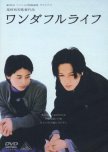
And so viewers join a group of counselors, long dead, as they work with the newly deceased to find their best memory. Each counselor is charged with several individuals, and they interview them one by one in order to root out what will make them most happy. As such, much of the film takes place in documentary-style interviews. We hear various stories from many individuals, diverse in ways from content to age range and era. However, there are a few unable to pin down anything anything at all. One man has never truly had a happy moment in his life, while another refuses to select anything despite ample material. Another young lady realizes times she thought were special were not quite as she remembered. What will happen to unfortunate people like these? There is also a mystery surrounding the counselors themselves… who are they and why were they chosen for this work?
Yet with such intense subject matter, After Life manages to be gentle and slyly humorous. It never reaches into your chest to tear out your heart, but delicately stirs that part of you which values sentimentality and fears death. What makes this film excellent is how carefully it explores these subjects: mortality and memory. It may induce laughter in you, perhaps it will leave a lump behind in your throat; but above all else, After Life will make you think long and hard. What would you choose?
Many familiar and veteran names grace the cast listing, such as Iura Arata, Terajima Susumu, and Iseya Yusuke. They stand out here as well, particularly the two counselors. However, the real stars are the memories and the people who share them. Many of the “interviews” were completely impromptu, and the people depicted are not actors, but real people reminiscing on film. Though it isn't clear which are scripted and which are authentic, they all leave great impact.
I always claim music is of paramount importance in both film and television. Despite this preference, it seems I've found an exception in After Life. This is a movie that does just fine without much of a soundtrack to recommend it. In fact, the silence lends realism, a solemn kind of respect and authenticity. There are no emotional cues for the audience, either…which is surprisingly nice for a change.
Was this review helpful to you?
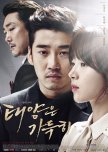
And so it goes with Beyond the Clouds, whose central theme is just this. Don’t mistake the drama for a common revenge yarn; though payback might be a driving force for many characters, it’s hard to call it “The Point.” Viewers should instead expect a classy, fatalistic romance, complete with slow-burning melodrama. Will these two deeply traumatized people fall in love despite their cruel circumstances? If they do, will a romantic connection hurt even more—or heal both, becoming their silver lining? That’s more “The Point,” and also the element that works most beautifully.
As to the revenge aspect, it’s fine if sometimes messy. I never fully believed or enjoyed the con-man angle. The “big bad” felt one-dimensional, as did his motivations, while other early villains were the same or even slightly unnecessary. That said, the dangerous atmosphere and situations created by their influence was excellent. It’s an odd combination, but it works.
Yoon Kye Sang stars as Jung Se Ro, a gentle man whose experiences have left him unpredictable and angry. This actor shines in Beyond the Clouds, handsome and magnetic. He grabbed my attention as if grabbing my head with both hands, so striking was his performance. Together with leading lady Han Ji Hye, he shared sparkling chemistry. Ji Hye enchants as Han Young Won, playing emotional and romantic scenes well. However, I often noticed her eyes open too wide too often, or glued firmly to the floor. The character can be meek on occasion, but these mannerisms were not strong choices at all.
Though I wasn't crazy about the whole con-man thing, Jo Jin Woong presents well as complicated Park Kang Jae. He’s the most believable and human of the seedy bunch, even the best connected to the main story. Tearful scenes seem to be his forte; he’s fantastic at them. A special mention is reserved for Kim Young Ok, probably the best “grandmother” actress ever. She made me cry so many times it isn’t funny.
Both cinematography and music embrace an elegant, almost classic feel. Early scenes in Thailand are a feast for the eyes, though the rest of the drama delights as well. Songs were well-chosen and interspersed to optimize emotional effect. Unlike in other melodramas, I never grew bored of any of it. Some great vocals include “Whale” (Zitten), “Sin,” (V.O.S), and “The Full Sun,” (Yang Pa).
Was this review helpful to you?

This drama joyously gallivants as a hilarious parody of the entire genre. It cleverly incorporates references from other famous detective shows (including the likes of Galileo and Detective Conan), and Japanese culture on the whole. Though our basic structure bears similarity to all classic detective stories (complete with episodic cases, familiar crime types, investigation, and denouement), most elements unabashedly embrace a gag or skit. Characters operate like a comedy team, from the detectives and police to suspects themselves.
Despite being nothing excellent or technically great, Watashi no Kirai na Tantei is still silly heaps of fun. This goes double if you like Japanese humor; be prepared to rewind back to certain parts for laughs alone. Not every joke works, but they do often enough. I wouldn't take it seriously as an investigation drama at all, though some cases occasionally ended up engaging nonetheless.
Tamaki Hiroshi possesses glorious comedic timing, most evident in the form of our lead: money-hungry detective Morio Ukai. Though the title may suggest the opposite, viewers will undoubtedly fall for his zippy delivery as the resident “straight man." That isn’t to discount his own oddities, however; for instance, he refuses to listen to the confessions of culprits, even if begged, and seems to prefer searching for lost purebred dogs above murder suspects. Shirashi Shunya sneaks past in a total surprise as “useless” Ryohei, whose assistance to the investigation team stops at his propensity for hilarity. Some scenes together with Tamaki-san were a riot.
Not so great is Gouriki Ayame, whose cutesy Akemi suits the show—that is, until she goes over the top and interrupts the comedic flow. Though this happens only occasionally, those times are almost painful. One unfortunate example actually encompasses most of an early case, where Akemi has her character spotlight (the UFO episode). Gouriki is quite cute, though, and there are some genuinely funny moments from her.
Note also the excellent cameo from Katagiri Jin (of comedy duo Rahmens and The Quiz Show fame). His inclusion was a big plus in of itself.
Music is as one would expect from any detective drama, though there are the occasional surprises. I found it overall pleasant and workable, if nothing worth buying an OST over. The theme stands out well, as does the ending vocal by Gouriki Ayame herself: "Anata no 100 no Kirai na Tokoro" (“The 100 Things That You Hate”).
Was this review helpful to you?

Of course, that isn't to say some of the offense is incomprehensible. To the Japanese, image means a lot. It’s also impossible to control how viewers digest what they've seen on television. "Will they take it all as fact?" With Ashita, typically fantastical and almost always exaggerated, that would be worrisome indeed. But as previously mentioned, best to take it as the last shadows of a child’s dream, a bittersweet fable. Does Ashita seek to impart a worthwhile message? Certainly, and it succeeds; after all, fairy tales were born from the desire to impart morals, and dreams often contain some kernel of truth. But though we can learn from them, we know they don't fully reflect reality.
This drama rolls along a simple format, one often seen in Japanese titles. In the first half, each episode focuses on a different child and their “trials” with foster homes. This structure allows the viewer to uncover character history individually, learning about everyone at Kogamo no Ie (roughly "House of Ducklings") bit by bit. Viewers will encounter a heavy tone, with certain scenes sporting almost horror film-esque attributes. Oddly enough, the home/orphanage itself wasn't depicted as shockingly as one might assume; it was rather the potential adoptive parents themselves.
Each plot thread shares airtime in the second half, building upon and resolving what we've learned until that point. My issues with the drama began at the juncture between these two halves. If changes were indeed made by the network to sooth public tension, I've been told it would have occurred here. The story lightens, allowing for its natural humor to come out much more. Yet I found Ashita crumbling in places, culminating in at least two subplots without satisfactory resolution. There was eventually dialogue that broke my immersion, lines which felt like sermons. Despite these problems, the emotional aspect of the drama works consistently well throughout its duration. Overall an involving watch, to say the least.
Not surprisingly, most members of the Ashita, Mama Ga Inai cast are children. Ashida Mana towers above the rest with a precocious talent, her turn as Post incredible. She begins by acting like a cynical delinquent writ small, yet develops slowly into a “little mother,” to the other children; this is a child too mature for her age, yet still a child nonetheless, and Mana owns the role from top to bottom. Suzuki Rio is another powerful, budding talent, a young lady who excels at the natural expression of a normal child. Her Donki could have been written better, but she does well with what she’s given. The other kids were often hit or miss, sometimes exaggerated to a cartoonish point (Bombi, sometimes Piami), though somber scenes brought out the absolute best in them.
From the adult half of the stage, we’ve scene-stealer Mikami Hiroshi as the darkly handsome yet gruff director Sasaki Tomonori-san (better known to his charges as “Maou/Devil King”). Thundering about on a limp leg, aided by a heavy cane, this is a mysterious character whose almost esoteric motivations lend much to the thought of Ashita as a fairy tale. Is this character a wicked devil or an unexpected angel? Either way, he's wildly interesting... and that "Tch?" Unforgettable.
Like the presence of “Maou,” music bolsters the fairy tale approach of this drama. Most tracks introduce a very emotional tone to scenes, with many sounding very light or magical, often in a melancholy way. For example, the theme “Dare Ka Watashi Wo,” (Kotoringo) sounds just like a lonely lullaby.
Was this review helpful to you?

In the United States, that conflict which came to be called “The Korean War,” holds another designation besides: “The Forgotten War.” Several reasons exist for this, but chief among them is actually timing. Wedged between heroic World War II and hellish Vietnam, amassing fewer American casualties, and yielding little accomplishment, these hostilities are often overshadowed and thus rarely remembered (unless someone mentions M*A*S*H, of course). And yet for Koreans, that this war could be “forgotten” is unthinkable. Its effects are likened unto wounds that ache even today, dividing an entire people along the scar known as the DMZ.
So why stop to talk history? Because, when it comes to a powerful drama like Comrades, it just seems necessary. As many among us have come to know and love South Korea (and not just for excellent entertainment, but its culture and people also), we ought to be aware of the painful history which has molded it until now. After all, that sentiment seems to be at the heart of Comrades: the fervent wish for the viewer to understand.
What’s more, this drama helps one to do so in an entertaining and sincere manner, without the heavy-handed ideology, pointed fingers, or macho-man heroism which might muddy its message. The plot unfolds tightly, abandoning exposition and filler to allow characters and events to stand for themselves. The viewer is never spoon-fed or told what to think, and thus free to see Comrades as it is: a story of ordinary people thrust into extraordinary circumstances. That means that even soldiers from the North are portrayed humanely, whereas not everything in the South comes across as noble. A drama which pulls no punches with any aspect, and never insults the intelligence of its viewers is all too rare.
And so we see The Korean War from a uniquely Korean perspective, following various participants (from South and North Korean soldiers, to guerrilla fighters and even deserters). We learn their stories, each unique and fleshed out, and often come to feel for them no matter the “side.” Not only men are represented, either, with female combatants frequently appearing in the narrative (and well-handled, at that). Yet the best thing about Comrades might be the fabulous characters of 1st Squad, and the deep bonds which form between them. Viewers spend most time with these men, growing to adore them as they fight and survive together. The term “bromance” was invented for such touching male friendships, and I'll never use it lightly again.
Despite the fact battles often occur on screen and action plays an important part in Comrades, the involving and personal nature of the story is what will stick with viewers. Though it might make you cry from the gut, pump your fist triumphantly, or cover your mouth in disbelief, it’s a chance worth taking. For war film and history lovers, you’ll doubtlessly adore Comrades. But if you’re hesitating because this is not your usual type of show, stop! You’ll never see a drama quite like this again, as mature, well-made, and without fear. And the only regret you’ll have after? How pale it makes others seem in comparison.
Perhaps no better Korean ensemble cast yet exists than the one in Comrades. Ever-immaculate Choi Soo Jong headlines as devoted and fatherly Lee Hyun Joong, the sergeant in charge of 1st Squad. This character’s love and care for his men exceeds that of his own life. As I told a friend, Choi appears slight, yet his presence looms large and vibrant; more impressive is that he manages this with a surprising humanity and straightforwardness. I’m extremely attached to Sergeant Lee, even now: an incredible role for an incredible actor.
From Choi Soo Jong, it becomes difficult to single out anyone, but not because they flow together. On the contrary, each character is so well-defined and acted that should I stop to name everyone that stood apart, we’d be here for many more paragraphs. Instead, I’ll list some of the best: Kim Roe Ha (complicated Sergeant Park), Lee Seung Hyo (brash Private Jung), and Ryu Sang Wook (pious Medic Joo Yong). Kim Myung Soo and Jung Tae Woo are notable from the North Korean side, while Lee In Hye and Lee Tae Ran do the ladies proud.
Nothing is more delightful than finding a cinematic soundtrack in a drama. Well, being able to find every track with its title translated might be (as was possible with this one). Almost everything is memorable, with nary a false note to be heard from tense and exciting themes (“Kyrie”) to those equally quiet and painful (“Salute to the Deceased”). Many of my favored Korean dramas tend to include Insooni on the soundtrack, and here her soulful voice haunts the shattering ballad “I Will Come Back.” Among other important vocals are “Requiem for the Unknown Soldiers,” (Gloomy 30’s), and the enduring, folksy “Friends,” offered by Kim Jang Hoon—and on occasion, the boys of 1st Squad. After the final episodes, this is a song that might burrow its way into your heart forever.
Was this review helpful to you?

Boku no Ita Jikan (“The Time I Was In,” internationally titled “The Hours of my Life,”) acquaints viewers with ALS, while painting an intimate portrait of a certain afflicted young man. This drama exults in the ordinary, from sets to characters and even plot points. Yet the propensity toward simplicity is exactly what produces any brilliance it might find. Main character Sawada Takuto could be any 20-something in Japan, but he could just as easily represent any young person anywhere. His goals appear unremarkable, his relationships familiar, his hobbies commonplace. But because they are also realistic, the generated reliability helps to connect viewers to the show. If nothing else, it will leave one questioning themselves. "How have I lived until now? Have I taken my time for granted?"
I would categorize this drama as inspirational, though also quite tragic. Many uplifting moments occur, yet these can be just as painful as the tearjerker scenes. For those wondering, a rather good love story does exist (and with surprising maturity, despite at least one "fish kiss"). There are a few cliches, unfortunately, including the most dreaded irritant: noble idiocy. Veterans of the genre might not enjoy Boku no Ita Jikan as much as others, either; there have been stronger, similar forays, though it brings a youthful flair to the table.
Miura Haruma starred in one of my first experiences with Japanese cinema about a thousand years ago, coincidentally another disease-oriented tale (Koizora). Though I've barely seen him after, I never forgot the effect that initial performance had on me. Meeting Miura-san again in Boku no Ita Jikan, I’m pleasantly surprised at his immense growth from then. His turn as Takuto is delightfully ordinary, yet powerful in its modesty. Most memorable will be his optimistic smile, though there were times I was floored in how deeply I felt Takuto’s fears. An actor with potential indeed.
I found leading lady Tabe Mikako only decent, though she performs well for the most part. Her Megumi takes the longest to “settle” and characterization seems somewhat fluid until around the mid-point. Chemistry with Miura Haruma is consistent, if more strongly felt in later episodes. Saito Takumi looks his best, though character Mukai Shigeyuki possesses a selfish streak. Due to subtle writing and this actor’s innate charm, Shige nevertheless remains painfully human. He might be a flawed jerk in many contexts, but he also has the potential to be genuinely friendly, observant, and likable in others. Nomura Shuhei is also notable, as he develops Rikuto into an surprisingly adorable and complete supporting character.
Pretty music accompanies Boku no Ita Jikan. Of particular note are vocals from Rihwa (“Harukaze/Spring Wind”) and Yuzu (“Yorokobi no Uta/A Song of Joy”). Sound effects are also utilized to a heart-rending degree, including the sound of a ticking clock bridging between scenes.
Was this review helpful to you?
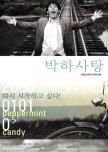
One might notice something unusual about Peppermint Candy straightaway: it’s backwards. It affects a non-linear structure, forcing the viewer to witness the lead’s story in reverse chronology. We start with a broken maniac ready to commit suicide on some train tracks, and end with a starry-eyed youth, happy and in love. What must have happened between these two points to result in such a drastic change?
That is what the viewer must uncover, journeying back through the years 1999 to 1979. The film separates into several segments to allow this, pinpointing only the most important details of the character’s life.
These specific years represent tremendous importance to the narrative, especially those sequences spent in the 1980’s. That decade was a particularly troubled one for South Korea; police brutality and government-sanctioned violence were not uncommon, as seen from the infamous protest crackdowns portrayed here in unabashed detail. The country many of us know and love today was a totally different place in that era.
Peppermint Candy relies heavily on visual motifs, particularly moving trains and the namesake sweets themselves. Trains appear at pivotal moments, usually during (or after) an unfortunate action taken by the lead. When I noticed this happening, the effect chilled; my stomach automatically dropped and I almost felt cold. Because the story segments are also broken up by footage taken from the back of a train, the effect is twofold. Note also the pensive string music which accompanies these instances. Other details become apparent over the course of the film; names and objects which make no sense in one part suddenly burst with recognition in another.
After seeing him as Kim Yong Ho, our tragic main character, Sol Kyung Gu definitely has my respect as an artist. He impressed unilaterally, whatever incarnation of the man he needed to portray. I hated and feared Yong Ho, I judged and even pitied him—but above all, I understood him. All this thanks to a masterful performance by a true talent. Moon So Ri also acted memorably, despite appearing very little; her Yun Sun Im was so built up, so discussed, over the course of the film, that it would have been easy to disappoint. She did not. The supporting cast does just as well, playing off the leads without drawing away focus.
Those viewers who devour character studies, art films, powerful acting, or are just looking for something different might take interest in Peppermint Candy. Please be warned that this movie contains varying degrees of violence, brief nudity, and depicts suicidal tendencies. Certain scenes can be disturbing.
Was this review helpful to you?

Though Jung Wan (Eugene) might be considered a traditional heroine, there are actually three leading ladies. Each woman has her own fully realized plot, with journeys so unique from the others (yet still connected!) that they could stand as three separate dramas. Does this result in a disjointed feeling? Not at all! The writers have a talent for seamless transitions, balancing characters and their evolving circumstances from episode to episode. Instead of being drawn out forever, even conflicts were frequently solved within an episode or two (crazy, I know).
This isn't true of the entire drama unfortunately; I could practically feel the steam seep out around near in late episodes. While not nearly enough to derail the entire experience, some cliches and melodramatics slithered in, while other bits were managed a little awkwardly.
A big pro for “Can We love?” is realism, despite obvious exaggeration here and there for entertainment’s sake. These characters have mundane worries for the most part (such as money trouble, single-parenthood, or romantic uncertainty). They have their foibles and quirks, but even at their worst they’re never the maniacs one often encounters in similar dramas. The second female lead will not be hitting her rival with a car, here, folks. You’ve probably met or heard of people like the “antagonists” in this drama…though in the case of a certain abusive mother-in-law, I hope not.
But for me, honestly, the best part must be the romance. Great kisses abound, with actual moving lips and touching. Because the characters are adults and act as such, they’re not mortified by the prospect of sex (pre-martial or otherwise). Couples communicate, both to solve problems and to build intimacy and knowledge of one another. The "main" pairing even felt like they were actually in love. I admit to giddiness with certain scenes, an uncommon occurrence.
Uhm Tae Woong was a primary source for such giddiness, as fast-talking charmer Oh Kyung Soo. Discard thoughts of him from other dramas, those intense and serious men; this role is completely the opposite. A “world-famous director,” Kyung Soo flirts, teases, and pursues what he wants with sincerity—whether in work or love. You might fall a little in love yourself, however your tastes run; he might be my favorite leading man to date. Leading lady Eugene embodies a gentle presence, easily becoming a sympathetic lead in Jung Wan. Her chemistry with Uhm Tae Woong sparkles, and her mothering scenes are fantastic.
Also notable: Kim Yoo Mi presents a complex and controversial Sun Mi. This actress masterfully handles tough, flawed women with hidden vulnerabilities. Choi Jung Yoon capably maneuvers the emotional tribulation and wide nuances required of Ji Hyun, though the character did not satisfy my interest as much as others. Kim Sung Soo (gentle and mature Do Young) and Park Min Woo (puppy-eyed noona killer Yoon Suk) round out the cast quite well.
What about the music? I found it above average, often memorable and always well-placed. While there isn’t a false note in the bunch, certain songs might wax repetitive for some viewers. The vocals are where the soundtrack really shines: “Everyday” (GGot Jam Project), “I Want to Love Again” (Lunafly), and
“My Hero” (Kim Ji Sook) are all excellent examples. Others include “Softly” (Sum & So Yeon), and a more elusive track, known affectionately to viewers during the drama’s run as the “Hey, Boy” song. You’ll know when you hear it.
Was this review helpful to you?
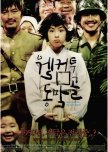
Simply described, Welcome to Dongmakgol leaves the impression of a Studio Ghibli animation sprung to life. The similarities are numerous, felt from the fanciful bones of the premise, right down to vivid ambiance set by the cinematography. Even music lends itself to the comparison, having been contributed by legendary Joe Hisashi. Little events (such as the incredible, now-famous, popcorn scene) might have been directed by Miyazaki himself. This is all intentional of course, a sure credit to Director Park Kwang Hyun (a self-proclaimed fan of the studio).
As one might glean from the information above, the story maintains elements of fantasy. North and South Korean soldiers, as well as one stranded American, end up meeting in an idyllic little village during the Korean War. They learn that the village, Dongmakgol, has been isolated for so long the inhabitants have no knowledge of the war, or modern technologies in general. From here, it develops into a story of friendship without borders, of innocence that brings happiness and peace, and reconciliation despite old wounds. Sprinkle in a little comedy and a heart-rending scene or two, and you've basically got Welcome to Dongmakgol.
The cast is phenomenal, as are the characters. Veteran actors Jung Jae Young (as North Korean officer Su Hwa) and Shin Ha Kyun (haunted South Korean Lieutenant Pyo) light up the screen. Being able to see both of these talents work together is such a treat, and their interactions with others are simply magnificent. Kang Hye Jung, best known from the Korean classic Oldboy, lands another iconic role here as the innocent and child-like Yeo Il. Together with Ryu Deok Hwan, she rounds up the memorable figures in the cast.
Unfortunately, the western actors were shakier. Steve Taschler doesn’t derail the film as Neil Smith, but his performance is obviously weaker than those around him. His character still manages to be somewhat interesting, despite these issues being combined with limited screen time.
Earlier I mentioned Joe Hisashi; fans of his work will automatically connect this name with quality. Those unfamiliar among you, don’t worry. This is music that has to be heard to be believed. Without his incredible compositions, the effect of the film would be nowhere as strong.
Was this review helpful to you?
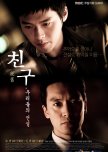
One enormous difference from other South Korean programs becomes apparent even before the series starts. Friend, Our Legend holds the distinction of being one of relatively few pre-produced dramas in that country. Free from pressure brought down by viewer feedback and ratings, no sudden crises could derail the vision. The effect is immediately noticeable when a story is told as intended.
On the surface, the aforementioned story appears to be nothing special. It is “merely” the tale of four close friends, whose troubled lives follow very different (and sometimes tragic) paths. Instead of falling into pitfalls of humdrum cliche or weepy melodrama, Friend, Our Legend elevates itself to an almost epic human story. Perhaps the plot moves slowly at times, but a subdued pace allows for the greatest understanding of characters and their circumstances. Viewers follow them through their lives, watching through childhood, right into high-school and adulthood. This aspect creates the sensation of knowing everyone in the drama intimately. Above all, realism might be the best thing Friend, Our Legend has going for it; even gangster culture is portrayed violently and without glamour…as it ought to be.
There’s always a catch, of course. Friend, Our Legend hurts to watch. Rather badly, in fact. I cannot, in good conscience, recommend this series to any empathetic or sensitive viewers. It is a violent and tragic experience, grim and heartrending. Bright spots exist in the narrative, but one always senses the storm will soon return. One should not expect to walk away from this experience smiling, but that isn't always the point. Sometimes the point is to become wholly immersed, to be affected, to think and feel deeply.
Actual problems do exist. One thing which didn't work for me was the unique flashback technique used in initial episodes. These sketch out the end-game of the drama, supposedly to drum up interest for the “how” of events rather than the “what.” This smacked of gimmick, as a linear telling would have done the trick without any of the added confusion. There was enough foreshadowing in the main body of the drama anyway. At the very least, it does not detract from enjoyment.
Are you a fan of Hyun Bin? If you said “No,” sit down with this and you will be. If your answer was “Yes,” tune into Friend, Our Legend immediately. Han Dong Soo might be the greatest role of his career thus far. “But what about Secret Garden?” you might ask. As well as Hyun Bin performed in that lovable drama, consider it a mere shadow of his work here. An actor might search his entire life for a particular character, a complicated and difficult one, the true challenge. Hyun Bin not only found his in Dong Soo, but completely inhabited and owned it. How incredible to watch a character as he evolves so completely.
Talented Kim Min Joon, who seems to catch my eye often nowadays, also captivated me as Lee Joon Seok. He might be chronically plagued by bad hair and fashion crimes throughout, but the character allowed him to showcase enormous range. Working with co-star Hyun Bin, he made me believe in the friendship between Dong Soo and Joon Seok...and many other things besides. In the form of Choi Jin Sook, Wang Ji Hye finally strikes a role to impress. My estimation of her rose from a pleasant presence to serious artist, all within the span of a few episodes. Though she leads a harsh existence, her Jin Sook displays strength and individualism that never allow her to be just "the love interest." This can be attributed to Ji Hye as much as the script.
Of the supporting cast, Seo Do Young fills up the roster steadily, while Lee Shi Yun refreshes with much-needed comic relief.
I loved the majority of the soundtrack to the depths of my heart and back. Other than some dated misses, especially suspense and gangster-centric sequences, everything fell mostly on point. Emotional scenes were often accompanied by mellow violins or a quiet, nostalgic female vocal, lifting them to new heights. Among the many fantastic inserts are “Closer” (Alex), “Can’t Have You” (Hyun Bin), and “Go and Erase Your Tears” (SS501’s Heo Young Saeng). Fans of Big Bang will also recognize “Friend,” (Tae Yang and T.O.P).
Was this review helpful to you?

Like similar Japanese dramas tend to do, Iki mo Dekinai Natsu moonlights as an educator on relevant social issues. Thus, as viewers, we learn about the presented material (here the koseki system), the hardships associated with it, and how people correct or learn to accept their situation. Though this formula might become obvious over time, because each theme is different, such shows often remain entertaining. Does that apply to this show too? You bet.
The subject matter alone elevates interest. As we follow Tanizaki Rei through her “breathless summer,” we witness what she and others suffer and might still…because they’re invisible legally. It’s twice as stunning to consider, as these things actually do happen (if rarely). My only suggestion would be to avoid synopses of Iki mo Dekinai Natsu which include a passage on passionate or forbidden romance; you will be sorely disappointed. This is primarily a human drama, and while romantic subtext exists, it’s so subtle as to fall between the lines.
While Takei Emi has an inherent likability, I find it hard to measure this particular performance. Some of her scenes fell flat or felt wrong, while others worked perfectly. Either way, because I could empathize with Rei-chan, some unevenness isn’t so bad.
Allow me one moment of superficiality. Eguchi Yosuke might be at his prettiest in this drama, sporting wavy locks and an infectious smile. The character might be a little on the simple side, but as always, talent will tell. Even if chemistry between the two (Eguchi and Takei) seemed a bit sparse, their interactions could be rather fun too. An honorable mention goes to Kaname Jun, whose despicable yet difficult Ayukawa Hiroki ended up much more nuanced than expected. It can be tough to tread such thin lines as an actor, but Kaname-san held it together well.
The Japanese tend to produce some of the best incidental music around.
Though that remains true here, they've made a point to include some western tracks too. Adele vocals are strewn throughout (“Set Fire to the Rain,” “Somebody Like You”). Despite the lyrics not fully mixing with certain scenes, these have an atmosphere and tone which strikes true. Bump of Chicken offers “firefly” as an added theme, a pleasant little number to close out each episode nicely indeed.
One (silly) word of warning: one may come away from this drama craving or resenting apple pie. It all depends on the person.
Was this review helpful to you?
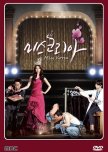
Why not begin by dispelling possible preconceptions? Miss Korea is not some cheap opportunity to watch lovely ladies prance and preen. It never glorifies the institution of the beauty contest, nor does it present beauty as the only measure of female worth. Unlike myriad other dramas, characters do not fall dead at the feet of resident beauties. There is also no ugly duckling plot-line; the lead character is attractive, accepted as such, and needs little more than trade knowledge and support. No Hollywood style, remove-the-glasses-and-change-the-girl makeovers here, folks.
So what exactly is Miss Korea then? It is the earnest tale of perseverance, hard work, friendship, and love. Flaunting quirky style and offbeat humor, viewers tag along as a gorgeous elevator girl, a cosmetics micro-company, and a gangster (who ought to have been a teacher) all chase after their dreams. While the beauty contest plays a large part, it is merely the means to an end. Some events might be a touch predictable, this or that element slightly off, but so much remains to be enjoyed.
But what is any script without an excellent and involving cast? Lee Yeon Hee comes to mind first, playing delightful lead Oh Ji Young. This actress depicts both the strength and vulnerability of her character with aplomb, lending herself easily to the required nuances. Ji Young is also one of my favorite female characters to ever appear in a drama; she displays personal fortitude without authority or martial skill, but with one courageous “Waikiki!” and a bright smile. Lee Sun Gyun falters a little in comparison. His Kim Hyun Joon starts off by rather being sleazy and difficult to like. Luckily, as his chemistry with Lee Yeon Hee stabilizes and the drama finds its pace, so does he; interactions with his leading lady become a definite highlight. I adored both actor and character by the end. Nothing can make his flashback sequences less awkward, sadly. There’s just no making the man look like a teenager.
Other memorable performances come from Lee Mi Sook (fascinating Ma Ae Ri, whom I would love to explain but cannot because she's that incredible), and Lee Sung Min (oddly lovable gangster: Teacher Jung). His every scene with Song Sun Mi (Go Hwa Jung) were highlights in of themselves. It isn't often I fall for supporting characters as much as the leads, but these guys made it easy. Not everything is peachy, though. My chief complaint tacks onto Lee Ki Woo; he's gorgeous, I've enjoyed him before, but his Yoon was a hateful character played too stiffly for my taste.
If one has heard nothing else about Miss Korea, they'll have at least heard how amazing the soundtrack is. As picky as I can get with music, I concur with that opinion wholeheartedly. From memorable instrumentals to fitting insert vocals, this drama has everything. Personal favorites include "Moonlight" (Onew of SHINee), "Hero" (J-Min), and pretty much anything contributed by Every Single Day. Such a great sound for a more than pleasant show.
Was this review helpful to you?
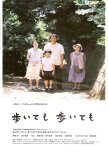
Still Walking centers on a particular day in the life of an ordinary Japanese family. While they try to maintain a semblance of normalcy on this day, the occasion cannot allow it to be wholly so. It is the memorial of a tragic death, and so even the most errant of relatives have come to call.
The story is told through beautifully written, but realistic conversations and domestic interactions between characters. While they cook, play, eat, or chat together, the dynamics between them slowly but surely unfold. We see fondness, pain, nostalgia, resentments, and all manner of feeling bubble to the surface. But none of this is done in the usual bombastic way, lending the entire piece more relatability than one might first imagine. It’s all very Japanese, but very human as well; how often have you swallowed a hurtful comment or urged yourself to forget it… just because of the ties that bind? I saw parts of my own family in Still Walking, little bites of conversation I've spoken myself. It leaves one with much to think about.
My chief issue would be that, while slow films rarely bother me, this takes a little *too* long to launch. Still Walking requires the viewer to see every minute to feel its effects to the highest measure. The ending also feels a little incomplete, but that can be overlooked; Still Walking is meant to portray life continuing under the cloud of death. We don’t always get perfect conclusions in real life, do we?
Calling out a particular actor or actress for an exemplary performance would be difficult. The entire ensemble works together so well they give the solid impression of an actual family, bitterness, warmth, and all. If forced to choose, Abe Hiroshi might win as the most easily recognizable among them; much of Still Walking focuses on his Ryota, and he’s arguably representative of Kore-eda himself. Kiki Kirin is also remarkable as Toshiko, the talkative and smiling mother who hides her many battle-scars behind polite words. She sometimes reminded me of my own mother, which was a little jarring.
A particular piece of music that sticks with me after completion is Blue Light Yokohama (Ishida Ayumi). If one has never "heard" nostalgia, this song will change that. Despite being quite the “oldie,” its inclusion is just exquisite. Common sounds are used effectively also; such as overlapping talk, popping and sizzling in the kitchen, etc.
Please note the interesting shots used in Still Walking. Detail in them is astounding, from hallways to individual rooms. The cinematography here lends an air of tranquility, of reality, of home…. My weak powers of description are not enough to describe the effect. One must truly see it for themselves.
Was this review helpful to you?






















